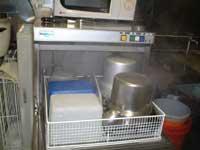When washing dishes there are those who consume a lot of water

In fact, these researchers have analyzed dishes cleaning habits in seven European countries. In the study, 75 volunteers cleaned the containers and cutlery that a family of four normally dirty a day; a total of 140 pots, plates, glasses and cutlery that allow dirt to dry for two hours. The researchers collected this work on video and measured how much water, energy and soap they spent.
The result is striking, especially when it comes to water consumption: some only need 15 liters of water, while others consume 345 liters of water. The most modern dishwashers spend between 12 and 20 liters of water.
It should also be noted that hand washing involves twice as much energy as using a dishwasher. In fact, manual cleaning means an average cost of 2.4 kW per hour and the machine spends half. In addition, only 15% of those who cleaned by hand left containers as clean as machine washes. On the other hand, the abundant use of soap and water does not allow a better result.
There are no significant differences between countries. For example, the study reveals that Germans and British spend less water and energy than Spaniards and Turks, but the Spanish leave the ships cleaner than anyone else. However, the difference depends above all on the individual custom.

For the cleaning of these 140 containers and appliances, the volunteers took an average of an hour and a half to spend 88 liters of water and 2.4 kW hour.
To achieve the best results, the researchers have recommended not to let the dirt dry and to use two periods of bath: the first to clean the containers with hot soapy water and the second to remove the remains of soap and dirt with cold water.
Information on this study has been published on the website of the scientific journal Nature. However, there is a fact to keep in mind that it does not appear on the web: The director of the study conducted by the University of Bonn works for the appliance company AEG. In addition, the study has been funded by several appliance manufacturers.
Buletina
Bidali zure helbide elektronikoa eta jaso asteroko buletina zure sarrera-ontzian











